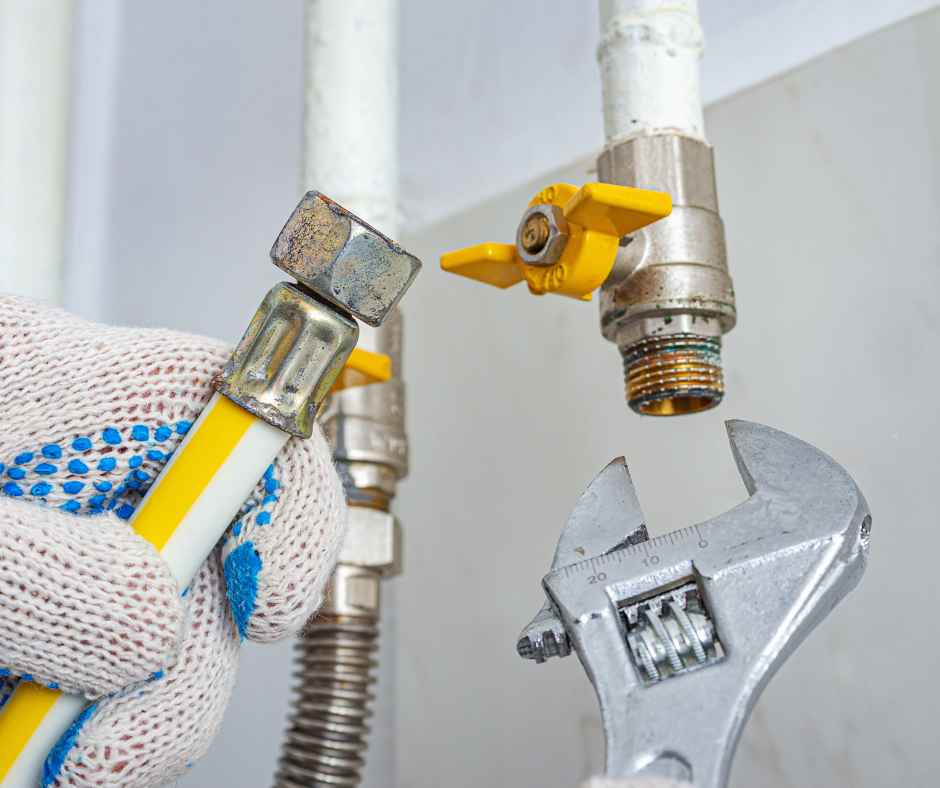Service 7 Days a Week

Proudly Serving Central Maryland
How To Know If You Have a Gas Leak

Save Time, Call Prime!
A gas leak is a serious issue that can pose risks to your health and safety. Detecting a gas leak early is crucial to preventing accidents, protecting your home, and keeping your family safe. But how can you tell if there is a gas leak? In this guide, we’ll explore the symptoms of a gas leak, the most common gas leak signs, and when to call for professional gas leak repair.
How to Tell If There Is a Gas Leak
How to know if you have a gas leak involves recognizing certain signs and symptoms. Natural gas is odorless, but utility companies add a chemical called mercaptan to give it a distinct sulfur-like or rotten egg smell. This is your first indicator of a potential gas leak. Here are other common gas leak signs to watch for:
- Smell of Rotten Eggs: If you detect a strong sulfuric odor, it’s a clear sign of a possible gas leak in the house.
- Hissing or Whistling Sounds: Gas escaping from a pipe or appliance may produce an audible hissing or whistling noise.
- Dead or Discolored Plants: A gas leak can deprive surrounding plants of oxygen, causing them to die or turn yellow.
- Bubbles in Water: If you notice bubbles in standing water near a gas line, this could indicate a natural gas leak.
- Increased Utility Bills: A sudden spike in your gas bill may mean that gas is escaping somewhere in your home.
Symptoms of a Gas Leak
Recognizing the symptoms of a gas leak is just as important as identifying physical signs. Exposure to a natural gas leak can affect your health and may lead to severe consequences if ignored. Common gas leak symptoms include:
- Headaches: Frequent, unexplained headaches could be a sign of low-level gas exposure.
- Dizziness or Lightheadedness: Prolonged exposure to gas can cause a lack of oxygen, leading to feelings of dizziness.
- Fatigue: A gas leak can make you feel unusually tired or weak.
- Nausea or Vomiting: Inhaling gas may result in stomach upset or nausea.
- Breathing Issues: Gas leaks can cause shortness of breath or difficulty breathing, especially in enclosed spaces.
- Irritated Eyes or Throat: Gas exposure can irritate mucous membranes, leading to itchy or watery eyes and a sore throat.
If you or your family members experience these natural gas leak symptoms, leave your home immediately and seek fresh air. Once you’re safe, contact a professional for emergency gas leak repair.
Common Causes of Gas Leaks
Understanding what can cause a gas leak may help you prevent one in the future. Common causes include:
- Damaged Gas Lines: External gas lines may be damaged by construction work, tree roots, or weather-related events.
- Faulty Appliances: Improperly installed or aging appliances, such as water heaters and stoves, can develop leaks over time.
- Loose Fittings or Connections: Gas pipes and fittings can loosen over time, allowing gas to escape.
- Corrosion: Older pipes are more prone to rust and corrosion, which can lead to leaks.
- Wear and Tear: Regular use of gas appliances can cause wear and tear that eventually leads to leaks.
How to Respond to a Gas Leak
If you suspect a gas leak in the house, it’s important to act quickly and follow these steps:
- Leave the Area Immediately: Evacuate everyone from the home and avoid using any electronic devices, including cell phones, near the leak.
- Don’t Light Flames: Avoid lighting matches, candles, or cigarettes, as they could ignite the gas.
- Turn Off the Gas Supply: If it’s safe to do so, turn off the main gas valve to prevent further leakage.
- Call for Help: Once you’re in a safe location, contact your gas company and a professional plumber for emergency gas leak repair.
- Don’t Re-Enter: Wait for professionals to inspect and clear your home before going back inside.
Why You Need Professional Gas Leak Repair
While it might be tempting to attempt a DIY fix, gas leak repair should always be left to trained professionals. Here’s why:
1. Safety First
Working with gas lines is dangerous. A professional plumber has the tools and expertise to locate and repair the leak safely.
2. Accurate Diagnosis
A professional can identify the exact location and cause of the gas leak, ensuring a thorough and long-lasting repair.
3. Compliance with Regulations
Gas line repairs must meet strict safety codes and regulations. Hiring a professional ensures your home remains up to code.
4. Peace of Mind
When you hire experts for gas leak repair, you can rest assured that the issue has been properly addressed, reducing the risk of future leaks.
Preventing Gas Leaks
Regular maintenance and proper care can help you avoid a gas leak. Here are some preventive measures:
- Inspect Gas Appliances Regularly: Schedule regular inspections to ensure your appliances are in good working order.
- Check for Loose Connections: Periodically check fittings and connections for signs of wear or looseness.
- Replace Aging Gas Lines: If your home has older gas lines, consider upgrading them to modern, safer materials.
- Install a Gas Detector: A gas detector can provide early warning of a natural gas leak, giving you time to act.
- Schedule Professional Maintenance: Routine plumbing maintenance from Prime Plumbing can help identify potential issues before they become major problems.
Contact Prime Plumbing for Reliable Gas Leak Repair
If you suspect a gas leak or need professional help, don’t wait. At Prime Plumbing, we specialize in detecting and repairing gas leaks to keep your home safe. Our team of experienced plumbers uses advanced tools and techniques to provide fast and reliable gas leak repair. Contact us today to schedule an inspection and ensure your peace of mind.
The Difference With Prime
Get a FREE second opinion on water and sewer service, and septic repair/replacements!
Don’t Just Take Our Word for it

Why Choose Prime Plumbing?
Professional Services at an Affordable Price
- Transparent Pricing
- No Additional Charges for Overtime
- Flexible Financing Solutions
- Thorough Employee Background Checks
- Complimentary Second Opinions

